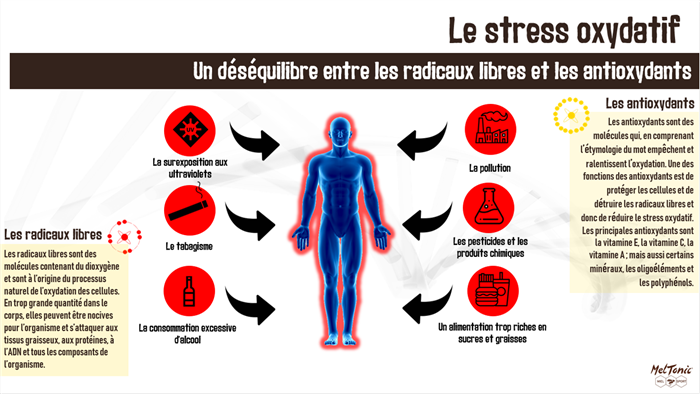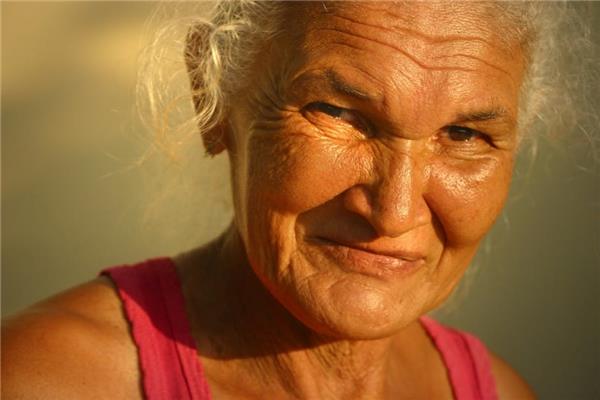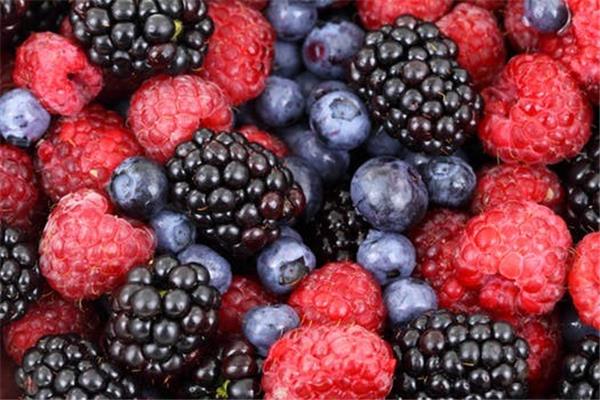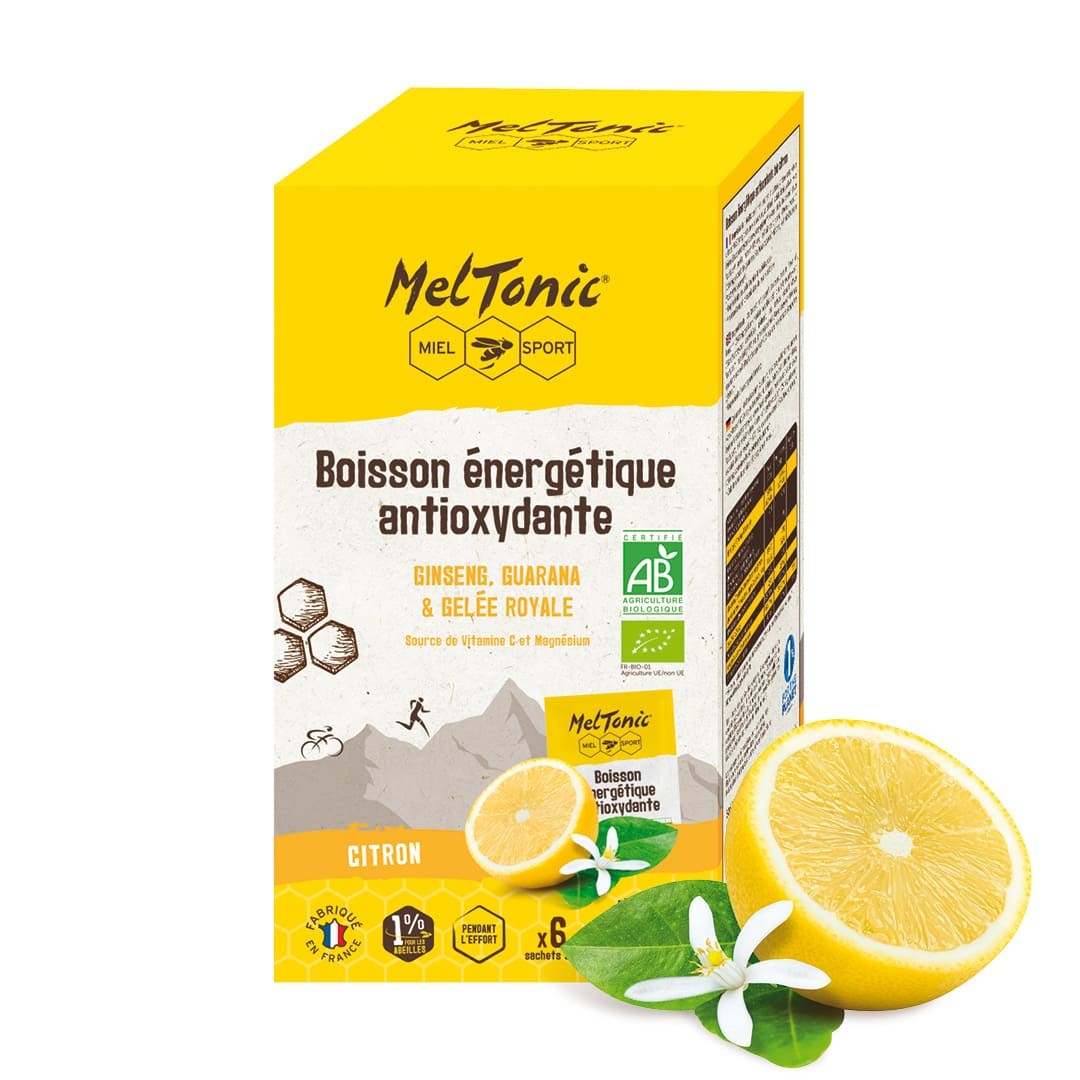
Sport & Health: Oxidative stress
Oxidative stress is the source of chronic diseases and the consequence of the presence of too many free radicals in the body. Oxidative stress is not to be confused with oxidation, which is a natural process that provides energy to the body's cells, or with psychological stress.

What is oxidative stress?
Oxidative stress is an imbalance between the excessive amount of free radicals and antioxidants.
Free radicals are molecules containing oxygen and are the origin of the natural process of cell oxidation. If there are too many of them in the body, they can be harmful to the organism and attack fatty tissue, proteins, DNA and all the components of the organism. When there is an imbalance of antioxidants and free radicals, the body's immune system is weakened and the body's defense mechanisms are damaged.
This anomaly is at the origin of chronic diseases such as diabetes, cancer, inflammatory diseases, Alzheimer's disease or Parkinson's disease. But let's remember that if the balance between antioxidants and free radicals is present, the latter are used by certain white blood cells and contribute to the destruction of bacteria and the regulation of dead cells.
Free radicals are therefore very unstable and chemically reactive molecules that are at the origin of oxidative stress and can be neutralized by antioxidants.

Oxidative stress, the source of cell aging
Oxidative stress also contributes to the accelerated aging of the body's cells. Although we also produce free radicals internally during an inflammatory reaction or during physical exercise, which are beneficial for our body, external reactions can also be at the origin of free radicals and thus of oxidative stress which is harmful to our health.
According to the ECOD project (Evaluation of the link between chemical environment, obesity and diabetes) carried out by the French Environmental Health Network, excessive adiposity (obesity) and smoking have a strong correlation with cellular aging. Indeed, these two factors would increase oxidative stress and the inflammation process that erodes the protective layer of chromosomes (telomeres). In addition, pollution, excessive exposure to ultraviolet rays, certain pesticides and other chemical agents, as well as a diet too rich in sugars, fats and alcohol, can also contribute to the excessive production of free radicals.

Oxidative stress and athletes
Physical effort amplifies the presence of free radicals and therefore of oxidative stress because breathing becomes more sustained and a greater quantity of oxygen is required. According to studies carried out by A. Pingitore, member of the Italian National Research Council, the relationship between sport and oxidative stress is complex because it depends on the mode, intensity and duration of the physical exercise. In fact, moderate physical effort appears to be beneficial for health. However, very intense sports activities such as ultra trail, marathon or cycling must be accompanied by an additional consumption of antioxidants to prevent and reduce the increase of oxidative stress in the body.
"Our antioxidant energy gel was designed to fight free radicals and provide natural energy during exercise"
How to fight against oxidative stress?
Moderate sports activity is therefore to be preferred if you want to avoid excessive production of free radicals. However, if certain physical activities are your passion in life (marathon, triathlon, trail running, cycling, ultra trail), it is important to bring an additional quantity of antioxidants in your body. Indeed, antioxidants are a good solution to reduce oxidative stress.
Antioxidants: Definition
According to Futura Sciences, the science and technology information portal, antioxidants are molecules that, understanding the etymology of the word, prevent and slow down oxidation. One of the functions of antioxidants is to protect cells, destroy free radicals and thus reduce oxidative stress. The main antioxidants are vitamin E, vitamin C, vitamin A, but also certain minerals such as trace elements and polyphenols. It is also important to remember that additional consumption of antioxidants requires a healthy and balanced diet because antioxidants cannot act alone. In fact, some antioxidants allow the regeneration of other antioxidants. For example, vitamin E cannot act without vitamin C or glutathione peroxidase is regenerated by vitamin E and trace elements.
It is essential to have a balanced diet, meaning that the dietary factors mentioned in this article must be consulted with a medical expert before increasing its consumption. Each individual has a unique body and a different reaction to the internal/external agents they may consume.

What are the most powerful antioxidant foods?
Many studies have been done to determine the antioxidant capabilities of foods.
The most powerful antioxidant foods are red fruits: raspberries, blueberries, goji berries, cranberries and acai berries.
Among the most antioxidant fruits are plums, apples, pomegranate and figs.
The most powerful antioxidant vegetables are cooked broccoli, spinach, kidney beans, artichoke hearts and pinto beans.
Nuts such as pistachios, hazelnuts, pecans and almonds also have significant antioxidant benefits.
Brewer's yeast is also very rich in antioxidants.
Finally, and most will jump for joy, foods such as chocolate, wine, green tea, coffee or oregano are also among the most powerful antioxidant foods, to be consumed in moderation naturally.
Are there any antioxidant foods suitable for athletes?
Yes, we have developed a range of natural antioxidant drinks designed for athletes:

Antioxidant lime energy drink individual packet
For hydration, a true source of electrolytes
Antioxidant energy drink:
- Contains Vitamin C, derived from brewer's yeast to fight against free radicals.
- Little sweetened not to make you sick during the effort
- Natural energy, with 4 tonic plants (Ginseng, Guarana, Maca, Maté) and Royal Jelly.
- Very practical, a stick predosed = a can.

